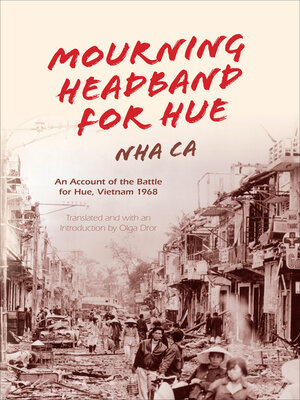
Sign up to save your library
With an OverDrive account, you can save your favorite libraries for at-a-glance information about availability. Find out more about OverDrive accounts.
Find this title in Libby, the library reading app by OverDrive.



Search for a digital library with this title
Title found at these libraries:
| Library Name | Distance |
|---|---|
| Loading... |
“An intimate―and disturbing―account of war at its most brutal, told from the point of view of civilians trying to survive the maelstrom.” —Publishers Weekly
Vietnam, January, 1968. As the citizens of Hue are preparing to celebrate Tet, the start of the Lunar New Year, Nha Ca arrives in the city to attend her father’s funeral. Without warning, war erupts all around them, drastically changing or cutting short their lives. After a month of fighting, their beautiful city lies in ruins and thousands of people are dead. Mourning Headband for Hue tells the story of what happened during the fierce North Vietnamese offensive and is an unvarnished and riveting account of war as experienced by ordinary people caught up in the violence.
“A visceral reminder of war’s intimate slaughter.” —Kirkus Reviews
“[A] searing eyewitness account . . . It makes for an intimate―and disturbing―account of war at its most brutal told from the point of view of civilians trying to survive the maelstrom.” —VVA Veteran
Vietnam, January, 1968. As the citizens of Hue are preparing to celebrate Tet, the start of the Lunar New Year, Nha Ca arrives in the city to attend her father’s funeral. Without warning, war erupts all around them, drastically changing or cutting short their lives. After a month of fighting, their beautiful city lies in ruins and thousands of people are dead. Mourning Headband for Hue tells the story of what happened during the fierce North Vietnamese offensive and is an unvarnished and riveting account of war as experienced by ordinary people caught up in the violence.
“A visceral reminder of war’s intimate slaughter.” —Kirkus Reviews
“[A] searing eyewitness account . . . It makes for an intimate―and disturbing―account of war at its most brutal told from the point of view of civilians trying to survive the maelstrom.” —VVA Veteran







